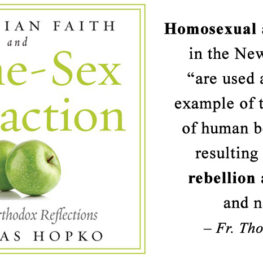Notes from the Underground | Dn. Stephen Hayes | April 27, 2007
This post is from the concluding chapter of my thesis on “Orthodox mission methods”, submitted in 1998. I have posted it mainly as a follow-up to the previous post and comments, especially the comments by Phil Johnson, on monasticism and utilitarianism.
In the history of Orthodox mission, we have seen two kinds of approach to the world. There is one where the world is evaluated positively, and another where it is evaluated negatively. In the first view, the world is seen primarily as God’s world, part of his good creation. In the second view, it is seen primarily as the fallen world, the world that lies in the power of the evil one.
These two approaches extend to cover the ecumene, the humanly inhabited world. They are found in relation to culture, to church and state, to the relation of the Church to human society. If Christians are in the world but not of it, then some have emphasised the importance of being in the world, and others have emphasised the importance of not being of this world. I have pointed out that I believe that both these approaches are authentic parts of the Orthodox tradition, and that both are in fact essential to the maintenance of that tradition.
How does this affect Orthodox mission as we approach the twenty-first century? In the First World, the predominant culture is post-Christian. Modernity has affected Christian thinking, and postmodernism has affected some of those who have abandoned the Christian faith altogether. In the Second World, several decades of communist rule have effectively secularised society, leading to a modern post-Enlightenment outlook, though it has sometimes taken a different form to that of the First World. In the Third World, Christianity has been expanding tremendously in Africa, and has been shifting from a Roman Catholic to a Protestant emphasis in Latin America, while remaining a minority religion in most of Asia. There is a sense in which postmodern culture is spreading throughout the world, though taking different forms in different places.
. . . more



